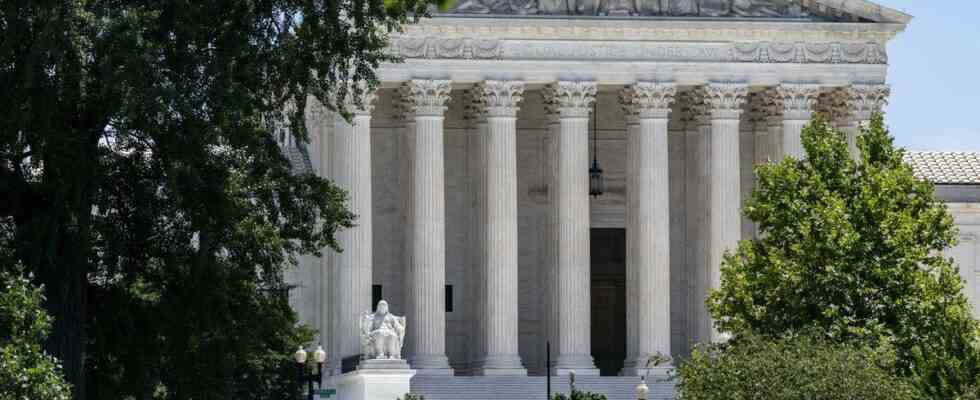The Supreme Court of the United States has already blasted the right to abortion. The very conservative body begins a new session on Monday which could end with other reversals, in particular for the rights of African-Americans or homosexual couples.
Discrimination, electoral law, immigration… Several explosive files are on the menu of the high court which is making its comeback with, for the first time in its history, a black woman among its judges. The arrival of Ketanji Brown Jackson, appointed by Democratic President Joe Biden, does not change the balance within the temple of American law: he retains a solid conservative majority of six judges out of nine, including three chosen by Republican Donald Trump. .
Sanctification of the carrying of weapons and restrictions of women’s rights
In 2021-2022, “the Court relied on this conservative bloc to revisit long-established case law” and “it seems ready to continue (…) without restraint”, according to David Cole, legal director of the powerful organization ACLU Civil Rights Advocate.
In June, the Supreme Court overturned the ruling that had guaranteed American women’s right to abortion for nearly 50 years, sanctified the right to bear arms, reinforced the place of religion in the public sphere and limited the powers of the public. environmental protection agency. His decisions plunged the left into disarray but delighted conservative circles, who for years denounced the “judicial militancy” of the Court, which had become the arbiter of major social debates.
Positive discrimination “in the crosshairs”
Ilya Shapiro, expert at the Manhattan Conservative Institute, believes that the Court is in the process of correcting “the excesses” of the 1970s. For him, the judgment which in 1978 defined the legal framework for discrimination positive in universities is the next “in the sights of the Court”.
On October 31, the high court will devote a hearing to the selection mechanisms in place at the prestigious Harvard University and the public university of North Carolina. These institutions, like many others, take into account ethnic criteria to ensure student diversity and correct the under-representation of young blacks and Hispanics resulting from the racist and segregationist past of the United States.
The electoral map in question
These policies, sometimes described as “reverse racism”, have always been the subject of challenges on the right but so far, the appeals have always failed. The Supreme Court itself has twice ruled that universities can take into account certain racial criteria provided that they are aimed solely at ensuring the diversity of the student population.
She now seems ready to back down. In another case, linked to an electoral map in the state of Alabama on the menu on Tuesday, she could unravel a section of the emblematic law of 1965 which put an end to the segregationist rules limiting the right to vote for African-Americans. in the south.
“Major consequences for democracy”
This “civil rights law” provides for the possibility of grouping black voters in a constituency to ensure that they have a few representatives. But it is illegal to concentrate them too much to diminish the weight of their vote. The stakes are high in a country where black voters overwhelmingly vote for Democrats, while white voters are more likely to support Republicans.
Another file, emanating from North Carolina, could “have serious consequences for democracy”, according to Sophia Lin Lakin, who follows electoral issues for the ACLU. Republican elected officials in this state are defending a new interpretation of the Constitution which, if taken up by the Supreme Court, would give “uncontrolled power to local legislators over the organization of federal elections”, she said.
Allow discrimination
Five years after having ruled in favor of a Christian pastry chef who did not want to sell a wedding cake to a male couple, the Supreme Court will also return to this sensitive subject, seized this time by a website creator. In 2018, she issued a limited-scope decision. This time, it could more broadly authorize merchants, whose products have a “creative” nature, to violate anti-discrimination laws in the name of their religious beliefs.
If we follow this logic, “architects could refuse to design houses for black families, pastry chefs to make birthday cakes for Muslim children…”, fears David Cole. By June 30, the deadline for rendering its judgments, the high court will also have to rule on the policies for deporting undocumented immigrants, the death penalty or the policies for adopting Native American children.

